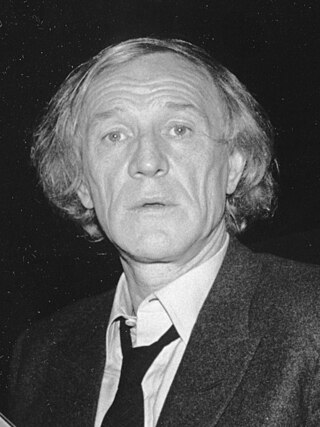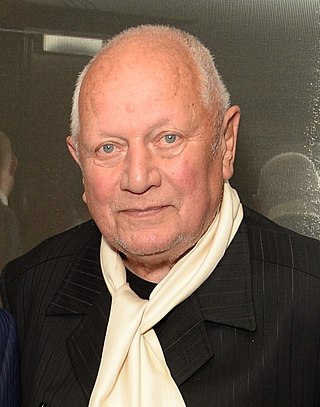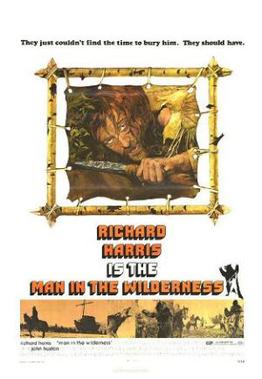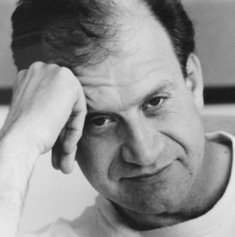
Richard St John Francis Harris was an Irish actor and singer. Having studied at the London Academy of Music and Dramatic Art, he rose to prominence as an icon of the British New Wave. He received numerous accolades including the Cannes Film Festival Award for Best Actor, and a Grammy Award. In 2020, he was listed at number 3 on The Irish Times's list of Ireland's greatest film actors.

Steven Berkoff is an English actor, author, playwright, theatre practitioner and theatre director.
Itzik Kol was an Israeli television and film producer considered by many to be a pioneer and originator of Israeli cinema. He died following complications from pneumonia.
Bernard "Bernie" Cornfeld was a prominent businessman and international financier who sold investments in US mutual funds, and who was tried and acquitted for mismanagement of the Investors Overseas Services (IOS).

Man in the Wilderness is a 1971 American revisionist Western film about a scout for a group of mountain men who are traversing the Northwestern United States during the 1820s. The scout is mauled by a bear and left to die by his companions. He survives and recuperates sufficiently to track his former comrades, forcing a confrontation over his abandonment. The story is loosely based on the life of Hugh Glass. It stars Richard Harris as Zachary Bass and John Huston as Captain Henry.

Richard Allen Boone was an American actor who starred in over 50 films and was notable for his roles in Westerns, including his starring role in the television series Have Gun – Will Travel.

Scrooge is a 1970 musical film adaptation of Charles Dickens' 1843 story A Christmas Carol. It was filmed in London between January and May 1970 and directed by Ronald Neame, and starred Albert Finney as Ebenezer Scrooge. The film's score was composed by Leslie Bricusse and arranged and conducted by Ian Fraser.

Cromwell is a 1970 British historical drama film written and directed by Ken Hughes. It is based on the life of Oliver Cromwell, who rose to lead the Parliamentary forces during the later years of the English Civil War and, as Lord Protector, ruled Great Britain and Ireland in the 1650s. It features an ensemble cast, led by Richard Harris as Cromwell and Alec Guinness as King Charles I, with Robert Morley as Edward Montagu, 2nd Earl of Manchester and Timothy Dalton as Prince Rupert of the Rhine.

George Pan Cosmatos was a Greek-Italian film director and screenwriter. Following early success in his home country with drama films such as Massacre in Rome with Richard Burton, Cosmatos retooled his career towards mainstream "blockbuster" action and adventure films, including The Cassandra Crossing and Escape to Athena, both of which were British-Italian co-productions. After relocating to North America, he directed the horror film Of Unknown Origin. This was followed by some of his best-known work, including the action films Rambo: First Blood Part II and Cobra, the science-fiction horror film Leviathan, and the critically acclaimed Western Tombstone.
Andrew Victor McLaglen was a British-born American film and television director, known for Westerns and adventure films, often starring John Wayne or James Stewart.

Villain is a 1971 British gangster film directed by Michael Tuchner and starring Richard Burton, Ian McShane, Nigel Davenport and Donald Sinden. It is based on James Barlow's 1968 novel The Burden of Proof. Villain was director Michael Tuchner's first feature film after directing in television.

Peter James Yates was an English film director and producer, known for his versatility and “attention to detail” across a variety of genres. He received nominations for four Academy Awards, three BAFTA Awards, and two Golden Globe Awards.

Renen Schorr is a film director, screenwriter, film producer and Israeli film activist. In 1989, he founded Israel's first independent, national school for film and television, the Sam Spiegel Film and Television School – Jerusalem, and has served as its director since that time. During the last 40 years he founded or co-founded the infrastructure of Israeli film funds and cinematheques. In December 2016 he was awarded the Chevalier des arts et lettres by the French government.

Assaf "Assi" Dayan was an Israeli film director, actor, screenwriter, and producer.

Rabbi Uri Zohar was an Israeli film director, actor and comedian who left the entertainment world to become an orthodox rabbi.
Bourekas films were a genre of Israeli-made comic melodrama films popular in Israel in the 1960s and 1970s.
John Stanley Livingstone Harris was a Scottish composer, producer, arranger, conductor, and musical director. He lived in the United States from 1972 until his death.

Clive Stanley Donner was a British film director who was part of the British New Wave, directing films such as The Caretaker, Nothing but the Best, What's New Pussycat?, and Here We Go Round the Mulberry Bush. He also directed television movies and commercials through the mid-1990s.

Isaiahu (Shaike) Levi is an Israeli comedian, singer and actor. He is best known for his role in the Gashash HaHiver comedy trio, which won the Israel Prize in 2000.

La Piscine is a 1969 psychological thriller film directed by Jacques Deray, starring Alain Delon, Romy Schneider, Maurice Ronet, and Jane Birkin.















